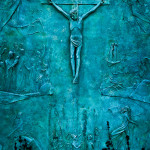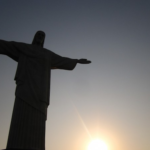We run our website the way we wished the whole internet worked: we provide high quality original content with no ads. We are funded solely by your direct support. Please consider supporting this project.

A Brief Theology of the Trinity
“The economic Trinity is the immanent Trinity, and the immanent Trinity is the economic Trinity.” This is the maxim introduced by the Catholic theologian Karl Rahner that should shape our discussion of the Trinity. It is simply a short-hand way of saying that since the way God is toward us in Christ truly reveals God, then there must be, at the very least, a strong analogical correspondence between who God is eternally (the immanent Trinity) and who God has revealed himself to be in Christ (the economic Trinity). Yet, if the immanent/economic distinction is to be retained, this correspondence cannot be a strict identity. There are contingent aspects of God’s revelation toward us—aspects such as God-becoming-human and God-becoming-sin—that we must consider to be absent in the way God exists within his threefold self prior to and apart from creation.
While a great deal could be said about the Trinity, I want to focus on the aspect of God’s revelation in Christ that must be affirmed if we are to understand the character of his eternal threefold identity. That is, while there is obviously no Incarnation or Crucifixion within the immanent Trinity prior to creation, we must affirm that the infinitely intense love of God that is expressed by the economic Trinity via God stooping an infinite distance to become what is antithetical to himself on Calvary expresses the unsurpassable intensity of the unwavering perfect love that the three divine Persons have for each other throughout eternity.
Moreover, inasmuch as the Church as the bride of Christ is a contingent expression of the Father’s perfect love for the Son that is mediated by the Spirit, and inasmuch as the bride, abiding in the Son, shares in the Son’s reception of the Father’s perfect love and participates in the Son’s perfect love for the Father mediated through the Spirit, we must go further and add that God’s revelation to us —which is synonymous with God’s salvation of us—expresses the perfect eternal love that unites the triune fellowship throughout eternity.
The best expression in Church history of the infinitely intense triune love that is revealed on the cross and that characterizes who God is eternally, in my estimation, is found in the Cappadocian concept of the perichoresis of the three Persons. In essence, this concept stipulates that the other-oriented love of the three divine Persons is such that throughout eternity they have completely given themselves over to one another and thus fully dwell within one another. I contend that the Church is graciously made a participant of this infinitely intense, triune, mutually-indwelling love that is incarnated and revealed in Christ.
I also contend that it is the perfect, eternal, other-oriented love of the triune community that comprises the true sense in which God is “immutable” and “impassible.” For whatever God experiences as he interacts with creatures in the course of history—however he is impacted or whatever plans get changed—this love is never improved, diminished, nor threatened. For this love is who God is. It is why we can trust that God is the same within himself as he is toward us, and why we can trust that the way he reveals himself to be in Christ is the way he’s always been. Moreover, it’s why we can trust that, while particular plans of God may fail inasmuch as they depend on the cooperation of free agents, the unconditional promise he has made in Christ to have a corporate body (the Church) who will co-rule with him in a redeemed creation that has been freed from all evil cannot fail.
The triune God is the Father, Son and Spirit who eternally give themselves to one another in love, which is most fully expressed in the self-giving of Christ on the cross. And now we, as a part of the bride of Christ, are invited to share in the love the Father has for the Son and to participate in the Son’s perfect love for the Father by the power of the Spirit.
Photo credit: Thomas Hawk via Visual hunt / CC BY-NC
Category: General
Tags: God, God is Love, Jesus, The Holy Spirit, Trinity
Topics: Trinity
Related Reading

Radical is in the Eye of the Beholder
Josias Hansen is a Brazilian-born, Charismatic Mennonite student at Luther Seminary in St. Paul, MN. Together with Third Way Church, Josias enjoys experimenting with what it looks like to take Jesus seriously as a jolly community of kingdom disciples. Was Jesus a radical? Did he do and teach radical things? What if I were to tell…

Is Jesus Really God?
While it is true that Jesus Himself never comes out and explicitly says He is God in the Gospels, He is everywhere portrayed in terms that lead us to conclude to the same thing. He says things like “If you see Me, you see the Father,” “Honor Me even as you honor the Father,” and…

What do you think of the classical view that God is impassible?
The classical view has historically held that God is impassible, meaning he is above pathos (passion or emotions). The main reason the church came to this view was that, following the Hellenistic philosophical tradition, they associated emotions with change while believing God was above all change (immutable). Moreover, experiencing emotions implies that one is affected…

Why Did Jesus Curse the Fig Tree?
One of the strangest episodes recorded in the Gospels is Jesus cursing a fig tree because he was hungry and it didn’t have any figs (Mk 11:12-14; Mt 21:18-19). It’s the only destructive miracle found in the New Testament. What’s particularly puzzling is that Mark tells us the reason the fig tree had no figs…

Seeing and Knowing God
There are many scripture passages that seem to suggest that the way people view God often says more about them than it does about God. Our perception of God, as well as other spiritual truths, is conditioned by the state of our heart. Jesus’ most important teaching on this matter is found in John’s Gospel…

Reflections on the Supremacy of Christ (Part 1)
In my previous post I argued that the Bible tells a story in which the culminating event – the coming of Christ – reframes everything that preceded it. Though it is all inspired, not everything in it should carry equal weight for us. Rather, everything leading up to Christ, including the portraits of God, must…
